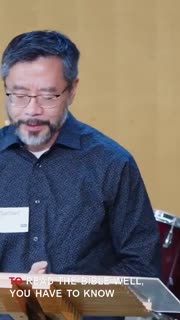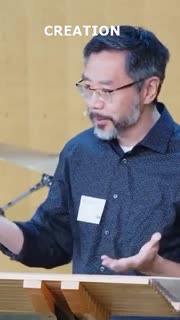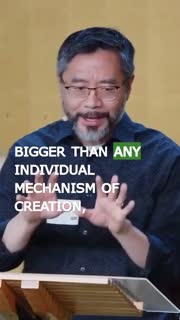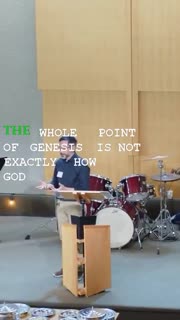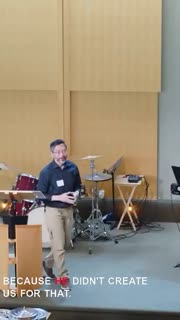Faith and Science: Understanding Genesis in Context
Summary
### Summary
In today's sermon, we explored the complex relationship between faith and science, particularly focusing on the creation narrative in Genesis 1-11. I began by sharing personal stories from my university days, where I struggled to reconcile scientific understanding with biblical teachings. This led us to examine how to read Genesis 1-11 well, emphasizing the importance of understanding its genre as an ancient origins account. We discussed how these chapters differ significantly from the rest of Genesis in terms of time span, geography, character development, and length.
We then delved into the similarities and contrasts between the biblical creation account and other ancient Mesopotamian and Egyptian origins stories. While there are common elements, the biblical narrative stands out for its monotheistic perspective and the unique role of humans as God's representatives on Earth. This understanding helps us see that the Bible and science are not necessarily in conflict; rather, they can complement each other when we recognize the genre and intent of the biblical text.
Next, we examined two key themes from Genesis 1-11: sin and divine mercy. The story of Adam and Eve's transgression is not just about a physical act but a symbolic spiritual rebellion against God's rule. This theme of sin and its consequences continues through the early chapters, culminating in the story of Noah, where God's mercy prevails despite human rebellion.
Finally, we discussed the relevance of these themes for us today. The narrative of Genesis serves as a mirror, reflecting our own sinfulness and need for God's grace. I shared the story of Dennis Lamoureux, a professor who journeyed from atheism to faith, illustrating how understanding the relationship between faith and science can deepen our spiritual lives. God is bigger than any single theory of creation, and He desires to deal with the sin in our lives so that we can live according to His design.
### Key Takeaways
1. Understanding Genesis 1-11 as an Ancient Origins Account: Recognizing the genre of Genesis 1-11 as an ancient origins account helps us reconcile the biblical creation narrative with scientific understanding. This perspective allows us to see that the Bible and science are not necessarily in conflict but can complement each other. [10:37]
2. The Symbolic Nature of Sin in Genesis: The story of Adam and Eve's transgression is more than a physical act; it represents a symbolic spiritual rebellion against God's rule. This understanding helps us see sin as a deeper issue of self-governance and autonomy from God, which has far-reaching consequences. [25:03]
3. God's Mercy Amidst Human Rebellion: Despite the pervasive theme of sin and rebellion in Genesis 1-11, God's mercy prevails. The story of Noah illustrates that God's compassion and mercy move the narrative forward, ultimately pointing to Jesus as the one who conquers sin. [32:01]
4. The Integration of Genesis 1-11 with the Rest of Scripture: While Genesis 1-11 is unique in its genre and content, it is seamlessly integrated with the rest of Genesis and the Bible. Themes from these early chapters are picked up and developed throughout Scripture, culminating in the New Testament and Revelation. [22:40]
5. Personal Reflection and Spiritual Growth: The narrative of Genesis serves as a mirror, reflecting our own sinfulness and need for God's grace. Understanding the relationship between faith and science can deepen our spiritual lives, as illustrated by the story of Dennis Lamoureux, who found that accepting scientific truths did not diminish his faith but strengthened it. [41:52]
### YouTube Chapters
[0:00] - Welcome
[00:56] - Struggling with Faith and Science
[01:50] - The Second Law of Thermodynamics
[02:39] - Confronting the Professor
[05:07] - Reconciling Different Worldviews
[05:59] - Understanding Genesis 1-11
[07:10] - Differences in Time Span and Geography
[09:25] - Character Development and Length
[10:37] - Genre of Genesis 1-11
[12:33] - Similarities with Ancient Origins Accounts
[13:47] - Contrasts with Ancient Origins Accounts
[14:30] - God's Role in Creation
[16:53] - Lightening the Mood with a Joke
[20:25] - Key Messages of Genesis
[21:23] - Integration of Genesis 1-11 with 12-50
[23:15] - Theme of Sin
[29:37] - Theme of Divine Mercy
[32:54] - Relevance for Today
[34:14] - Story of Dennis Lamoureux
[41:52] - Faith and Science in Harmony
[42:53] - Closing Remarks
Study Guide
### Bible Reading
1. Genesis 1:1-2:3 - The Creation Account
2. Genesis 3:1-24 - The Fall of Man
3. Genesis 6:5-8 - The Wickedness of Mankind and God's Grief
### Observation Questions
1. What are some key differences between Genesis 1-11 and Genesis 12-50 in terms of time span, geography, character development, and length? [07:10]
2. How does the biblical creation account in Genesis differ from other ancient Mesopotamian and Egyptian origins stories? [12:33]
3. What is the significance of the tree of the knowledge of good and evil in the story of Adam and Eve? [24:10]
4. How does the story of Noah illustrate God's mercy amidst human rebellion? [32:01]
### Interpretation Questions
1. Why is it important to understand Genesis 1-11 as an ancient origins account rather than a scientific explanation? How does this perspective help reconcile faith and science? [10:37]
2. In what ways does the symbolic nature of sin in Genesis 3 reflect deeper spiritual truths about human autonomy and rebellion against God? [25:03]
3. How does the theme of divine mercy in the story of Noah point forward to the ultimate victory over sin through Jesus? [32:01]
4. How does understanding the integration of Genesis 1-11 with the rest of Scripture enhance our comprehension of the Bible's overarching narrative? [22:40]
### Application Questions
1. Reflect on a time when you struggled to reconcile your faith with scientific understanding. How did you navigate that tension, and what helped you find peace? [00:56]
2. The story of Adam and Eve highlights the temptation to define good and evil on our own terms. Are there areas in your life where you are tempted to rely on your own understanding rather than God's wisdom? How can you surrender these areas to God? [25:03]
3. The narrative of Noah shows God's mercy despite human rebellion. How have you experienced God's mercy in your own life, even when you have strayed from His path? [32:01]
4. Understanding Genesis 1-11 as an ancient origins account can help us see that the Bible and science are not necessarily in conflict. How can this perspective change the way you engage with scientific discussions in your community or workplace? [10:37]
5. The story of Dennis Lamoureux illustrates how understanding the relationship between faith and science can deepen our spiritual lives. How can you use your understanding of this relationship to strengthen your faith and witness to others? [41:52]
6. Genesis serves as a mirror reflecting our own sinfulness and need for God's grace. What specific steps can you take this week to address areas of sin in your life and seek God's forgiveness and guidance? [32:54]
7. How can the themes of sin and divine mercy in Genesis 1-11 inspire you to live according to God's design and purpose for your life? What practical changes can you make to align more closely with His will? [32:01]
Devotional
Day 1: Understanding Genesis 1-11 as an Ancient Origins Account
Understanding Genesis 1-11 as an ancient origins account helps bridge the gap between biblical creation narratives and scientific understanding. By recognizing the genre and intent of these chapters, one can see that the Bible and science are not necessarily in conflict but can complement each other. This perspective allows believers to appreciate the theological messages in Genesis without dismissing scientific discoveries. The ancient origins account genre emphasizes the theological truths about God, humanity, and the world, rather than providing a scientific explanation of creation.
Genesis 1-11 differs significantly from the rest of Genesis in terms of time span, geography, character development, and length. These chapters set the stage for the rest of the biblical narrative by introducing key themes and theological concepts. Understanding this context helps readers appreciate the unique role of these chapters in the broader biblical story. By viewing Genesis 1-11 through the lens of its ancient genre, believers can find harmony between their faith and scientific understanding. [10:37]
Genesis 1:1-2 (ESV): "In the beginning, God created the heavens and the earth. The earth was without form and void, and darkness was over the face of the deep. And the Spirit of God was hovering over the face of the waters."
Reflection: How does understanding Genesis 1-11 as an ancient origins account change your perspective on the relationship between faith and science? Can you think of a specific scientific concept that you can now view in harmony with your faith?
Day 2: The Symbolic Nature of Sin in Genesis
The story of Adam and Eve's transgression in Genesis is more than a physical act; it represents a symbolic spiritual rebellion against God's rule. This understanding helps us see sin as a deeper issue of self-governance and autonomy from God, which has far-reaching consequences. The narrative of the Fall illustrates how humanity's desire for independence from God leads to broken relationships and a fractured world.
Sin in Genesis is portrayed as a fundamental rejection of God's authority and a desire to determine one's own destiny. This theme is evident in the actions of Adam and Eve, who choose to eat from the forbidden tree despite God's clear command. Their decision symbolizes humanity's ongoing struggle with sin and the temptation to prioritize self-will over divine guidance. Recognizing the symbolic nature of sin in Genesis helps believers understand the profound impact of sin on their lives and the world around them. [25:03]
Genesis 3:6-7 (ESV): "So when the woman saw that the tree was good for food, and that it was a delight to the eyes, and that the tree was to be desired to make one wise, she took of its fruit and ate, and she also gave some to her husband who was with her, and he ate. Then the eyes of both were opened, and they knew that they were naked. And they sewed fig leaves together and made themselves loincloths."
Reflection: In what areas of your life do you find yourself struggling with self-governance and autonomy from God? How can you surrender these areas to His authority today?
Day 3: God's Mercy Amidst Human Rebellion
Despite the pervasive theme of sin and rebellion in Genesis 1-11, God's mercy prevails. The story of Noah illustrates that God's compassion and mercy move the narrative forward, ultimately pointing to Jesus as the one who conquers sin. Even in the face of widespread human wickedness, God chooses to preserve humanity through Noah and his family, demonstrating His commitment to redemption and restoration.
God's mercy is a central theme in Genesis 1-11, highlighting His willingness to forgive and restore despite human rebellion. The narrative of the Flood shows that while God judges sin, He also provides a means of salvation. This pattern of judgment and mercy continues throughout the Bible, culminating in the ultimate act of mercy through Jesus Christ. Understanding God's mercy in Genesis helps believers appreciate the depth of His love and grace, even in the midst of their own failures. [32:01]
Genesis 6:8-9 (ESV): "But Noah found favor in the eyes of the Lord. These are the generations of Noah. Noah was a righteous man, blameless in his generation. Noah walked with God."
Reflection: Reflect on a time when you experienced God's mercy in your life despite your own shortcomings. How can you extend that same mercy to others around you today?
Day 4: The Integration of Genesis 1-11 with the Rest of Scripture
While Genesis 1-11 is unique in its genre and content, it is seamlessly integrated with the rest of Genesis and the Bible. Themes from these early chapters are picked up and developed throughout Scripture, culminating in the New Testament and Revelation. This integration highlights the continuity of God's redemptive plan from creation to the end of time.
The themes of creation, sin, and redemption introduced in Genesis 1-11 are foundational to the entire biblical narrative. These chapters set the stage for the unfolding story of God's relationship with humanity, His covenant promises, and His ultimate plan for salvation through Jesus Christ. Recognizing the integration of Genesis 1-11 with the rest of Scripture helps believers see the coherence and unity of the Bible, deepening their understanding of God's overarching plan. [22:40]
Genesis 12:1-3 (ESV): "Now the Lord said to Abram, 'Go from your country and your kindred and your father's house to the land that I will show you. And I will make of you a great nation, and I will bless you and make your name great, so that you will be a blessing. I will bless those who bless you, and him who dishonors you I will curse, and in you all the families of the earth shall be blessed.'"
Reflection: How do the themes introduced in Genesis 1-11 help you understand the rest of the Bible? Can you identify a specific theme that resonates with your personal faith journey?
Day 5: Personal Reflection and Spiritual Growth
The narrative of Genesis serves as a mirror, reflecting our own sinfulness and need for God's grace. Understanding the relationship between faith and science can deepen our spiritual lives, as illustrated by the story of Dennis Lamoureux, who found that accepting scientific truths did not diminish his faith but strengthened it. This integration of faith and science can lead to a more robust and informed spiritual journey.
Personal reflection on the themes of Genesis 1-11 can help believers recognize their own need for God's grace and mercy. By acknowledging the symbolic nature of sin and the reality of divine mercy, individuals can grow in their understanding of God's character and His redemptive plan. The story of Dennis Lamoureux serves as an example of how embracing scientific understanding can enhance one's faith, leading to a deeper appreciation of God's creation and His work in the world. [41:52]
Psalm 19:1-2 (ESV): "The heavens declare the glory of God, and the sky above proclaims his handiwork. Day to day pours out speech, and night to night reveals knowledge."
Reflection: How can you integrate your understanding of science with your faith to deepen your spiritual growth? What steps can you take today to explore this relationship further?
Quotes
1. "How do you reconcile these different ideas, these different worldviews and understandings? Okay, so here's my outline. Here's what I'd like to do today. I'd like to talk first about how to read Genesis 1 to 11 well. How do we read Genesis 1 to 11 well? This first part of the Bible. Second, I want to pick out two key themes from these passages, from this text, chapters 1 to 11, that some of you have studied in GCC this past week. Two key themes, and continue to think about these themes. And then finally, I want to talk about the relevance of those themes for us today." [05:07] (41 seconds)
2. "To read the Bible well, you have to know what kind of genre you're reading when you're in that part of the Bible. It's like the difference between reading a newspaper versus reading a novel. Or maybe the difference between reading a chemistry textbook and reading a comic book. There are different kinds of literature, different kinds of genres. So if you go to... If you go to school reading a textbook like you do a comic book, it's not going to be very helpful for you. Or if you go and read a novel the way you read a newspaper, it's not going to be very enjoyable for you." [06:29] (38 seconds)
3. "In the biblical creation account, there is one God who is supreme. He speaks, and simply the world comes into being. There is no one who contests Him. There is no one battling against Him. He is one sovereign God above all else. And He doesn't create humankind to serve Him as slaves so that He doesn't have to labor. We learned that last week. He's created human beings as a climax of His creation to be His representatives on the earth. Totally different understanding." [13:11] (34 seconds)
4. "If I could go back in time and speak to my engineer friend about the seven days of creation or the six days of creation, I would tell him that there's actually no conflict between science and faith. There's no conflict between creation and evolution, not necessarily. It is a false dichotomy. It's a misunderstanding both of what the Bible is as well as of what science is." [15:07] (24 seconds)
5. "God is bigger than any individual mechanism of creation, whether that's a 24-day literal seven-day 24-hour period, six days, or whether it is through evolution and over spans of hundreds of millions or billions of years. God is bigger than any one theory of creation. He is the one definitely doing all of it." [16:13] (27 seconds)
6. "The whole point of Genesis is not exactly how God created the world, but that he created the world. The whole point is not the physical composition of us human beings, but our relationship with this creator God. And our relationship with each other and with this planet that he's put us on. That's the point of these chapters in Genesis." [20:25] (35 seconds)
7. "Ultimately, the point of these chapters is to be able to read them and use them as a mirror and see that the sin is not just out there, the brokenness is not just out there. But it's a reflection of my own heart as well. It's a reflection of who I am, who I tend to be as well outside of God's grace. It's a reflection of our own rebelliousness, our own sinfulness, our own self-centeredness. That's a reflection of our own need to be rescued from that state." [33:23] (38 seconds)
8. "He wants to deal with that sin in our lives because he didn't create us for that. And that sin in our lives, represents something that is much, much less than what God's intention is for us. It's much less than what God has in store for us. And so he wants to deal with that sin in our lives so that we can live in a way that he's designed for us to be. He wants that for us and he's provided a way for us to do that in Jesus." [42:23] (34 seconds)

